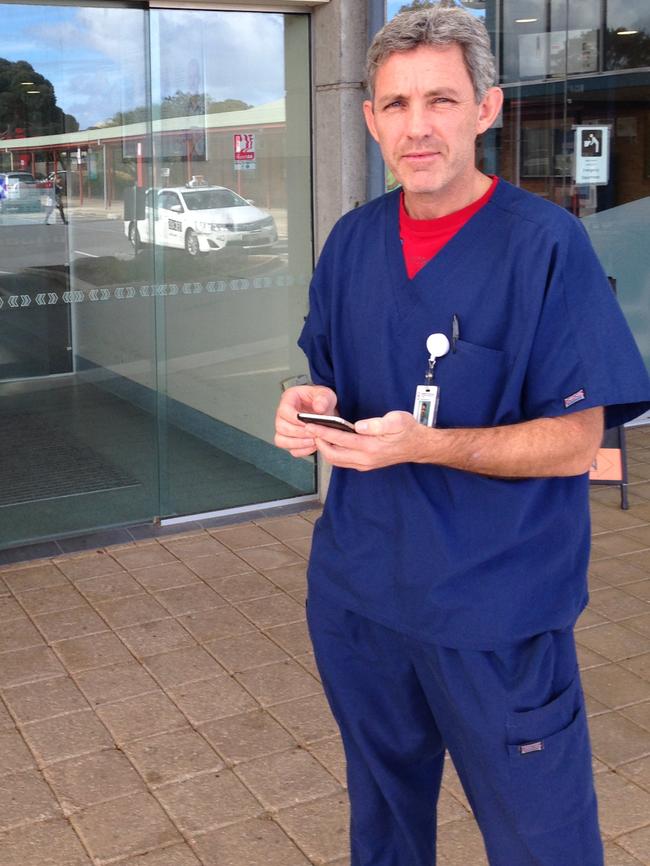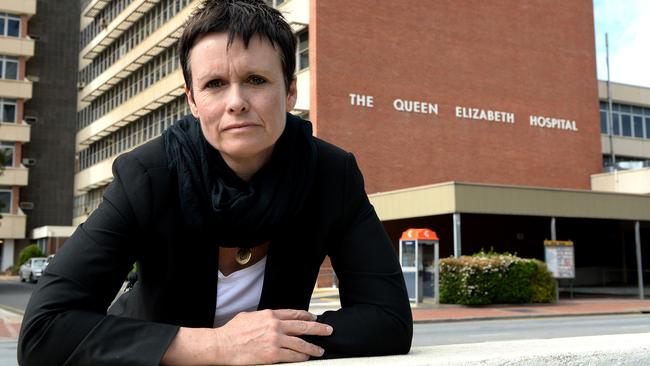Electronic Enterprise Patient Administration System: Asset or liability?
THE controversial electronic Enterprise Patient Administration System goes “live” at The Queen Elizabeth Hospital on June 29. EPAS has a conga line of clinical critics — but also is slowly gaining fans.

SA News
Don't miss out on the headlines from SA News. Followed categories will be added to My News.
- New Royal Adelaide Hospital floors not strong enough to handle weight of paper patient records
- EPAS labelled a dud by South Australian doctors forced to use it
- Will EPAS be ready in time for new RAH opening?
THE controversial electronic Enterprise Patient Administration System replacing public hospital patients’ paper records goes “live” at The Queen Elizabeth Hospital on June 29. EPAS has encountered ongoing delays, a $200 million budget blowout and a conga line of clinical critics — but also is slowly gaining fans.
Instant health access ends the paper chase
THE CASE FOR
DR Jim Holland likes his sport and his job. Now he can browse patients’ records in real time — checking anything from their latest blood pressure to their most recent medication on his smartphone — while watching the footy on his day off.
For the clinical director of the Noarlunga Hospital emergency department, it is a world away from fossicking around for paper records or talking over a patient’s condition with colleagues on the phone. Dr Holland is a fan of EPAS and predicts others eventually will be equally enthusiastic — once they master the system.

In a sign of the times at Noarlunga, during our interview Dr Holland realises he is not carrying a pen. Noarlunga is largely paperless since it became the state’s first hospital to switch to EPAS in August 2013.
The introduction was not without hiccups. Clinical activity fell dramatically as staff struggled with a “clunky” new computer system.
Nearly three years down the track, and after numerous upgrades to the system, Dr Holland says going back to paper records would be unthinkable.
“It would be archaic,” he said. “If you took a random survey in the ED, I reckon at least 95 per cent of people would say it is an improvement.”
While there are claims the system puts patients at risk, Dr Holland and SA Health Chief Medical Officer Paddy Phillips point to some telling statistics from the three hospitals now using EPAS.
Before EPAS, audits found 5.8 per cent of all drug orders at Noarlunga, Repatriation General and Port Augusta hospitals had an incorrect dose, frequency or route (oral or intravenous). It has since fallen to 0.03 per cent — a change in medication error rates from one in 20 patients to one in 3000. In Noarlunga’s ED, monitors linked to EPAS are on mobile workstations as well as in the central area so staff can wheel a screen from patient to patient in cubicles. They can instantly check conditions of other patients without chasing up paper charts, and several users can view a patient’s condition at one time.
“Everything is visible to everyone. It is safer for us,” Dr Holland said.
He notes EPAS automatically alerts users if a patient has been prescribed a medicine that might cause an allergic reaction or if a dosage is unusual. In the past year alone, 15,000 automatic allergy alerts were triggered at the three EPAS hospitals — in the vast majority of cases, clinicians were aware of the allergy, but alerts serve as a safety net.
Some paper records must be scanned into the system, such as GP referrals, but Dr Holland says this is not a problem.
Prof Phillips said Noarlunga pioneered the system and it had evolved dramatically as clinicians gave feedback.
“I remember using my first ATM in about 1980 and in a blink went from needing a bankbook when banks were open to being able to get cash 24/7 thanks to technology — it is the same in health going from paper records to electronic,” he said.

A rolling disaster that compromises safety
THE CASE AGAINST
THE line-up of groups and individuals criticising EPAS and even calling for it to be dumped is something of a who’s who of the medical community. While individual doctors employed in public hospitals put their careers on the line if they publicly criticise the system, their peer groups have been vocal in labelling it a dud.
The Royal Australasian College of Surgeons has warned patient safety cannot be guaranteed under the system.
While the college supports the move to electronic records, it says feedback from members shows it is a very difficult system to work with and on occasion has prevented doctors from prescribing essential medications to patients. The college says “it would be disastrous to roll out a patient-administration system without the appropriate level of functionality” and that feedback from surgeons working in high-pressure situations shows it is more than just “teething problems”.
The Salaried Medical Officers Association of SA has called for the EPAS rollout to be reconsidered in light of ongoing problems and difficulty in rectifying them.
SASMOA industrial officer Bernadette Mulholland said the association continued to get complaints from members about difficulty using the system, including from ED doctors at Noarlunga.
“If it does not work properly in a hospital the size of the QEH when it starts there later this month, the Government must reconsider introducing it at the new RAH,” she said.
Clinicians at the Repatriation General Hospital, where EPAS is in use, last year wrote to SA Health officials warning the introduction had caused a 50 per cent cut to clinical activity. In March, The Advertiser revealed clinicians at Port Augusta Hospital, where EPAS is in use, wrote to Health Minister Jack Snelling pointing out 37 major flaws — including incorrect medication being given.
“Please take EPAS away . . . please replace EPAS with something much better,” implores the letter from the Flinders and Far North Doctors Association, obtained by The Advertiser. The Australian Medical Association has called for the overall Transforming Health project to be put on hold.
Following a survey of members showing 70 per cent felt the overhaul of the health system would put patients at risk, SA president Dr Janice Fletcher said: “There is significant concern the government is quite simply trying to do too much too soon with its reconfiguration of hospital services at the same time as the move to the new RAH and introduction of EPAS.”
Prominent critic of the overall Transforming Health project, Professor Warren Jones – a former department head at Flinders Medical Centre – said significant concerns had been raised by the Auditor-General about the project. And Opposition health spokesman Stephen Wade said: “EPAS has been a rolling disaster. Clinicians who have been forced to use it report that it is cumbersome, prone to errors and increases the risk to patient health.”


